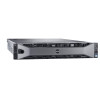Dell PowerVault DR6000 Owners Manual - Page 20
Boot Settings Screen, Integrated Devices Screen, BIOS Boot Settings
 |
View all Dell PowerVault DR6000 manuals
Add to My Manuals
Save this manual to your list of manuals |
Page 20 highlights
Menu Item Level 2 Cache Level 3 Cache Number of Cores Description Displays the total L2 cache. Displays the total L3 cache. Displays the number of cores per processor. Boot Settings Screen Menu Item Description Boot Mode Allows you to set the boot mode of the system. CAUTION: Switching the boot mode may prevent the system from booting if the operating system is not installed in the same boot mode. By default, the Boot Mode option is set to BIOS. Boot Sequence Retry Allows you to enable or disable the boot sequence retry feature. If this field is enabled and the system fails to boot, the system reattempts the boot sequence after 30 seconds. By default, the Boot Sequence Retry option is set to Disabled. BIOS Boot Settings Allows you to enable or disable BIOS Boot options. NOTE: This option is enabled only if the boot mode is BIOS. One-Time Boot Allows you to enable or disable a one-time boot from a selected device. Integrated Devices Screen Menu Item Integrated RAID Controller User Accessible USB Ports Internal USB Port Internal SD Card Port Description Allows you to enable or disable the integrated RAID controller. By default, the Integrated RAID Controller option is set to Enabled. Allows you enable or disable the user accessible USB ports. Selecting Only Back Ports On disables the front USB ports and selecting All Ports Off disables both front and back USB ports. By default, the User Accessible USB Ports option is set to All Ports On. Allows you to enable or disable the internal USB port. By default, the Internal USB Port option is set to On. Enables or disables the system's internal SD card port. By default, the Internal SD Card Port option is set to On. NOTE: This option is displayed only if IDSDM is installed on the system board. Internal SD Card Redundancy If set to Mirror mode, data is written on both SD cards. If any one of the SD card fails, data is written to the active SD card. Data from this card is copied to the replacement SD card at the next boot. By default, Internal SD Card Redundancy option is set to Mirror. NOTE: This option is displayed only if IDSDM is installed on the system board. 20















